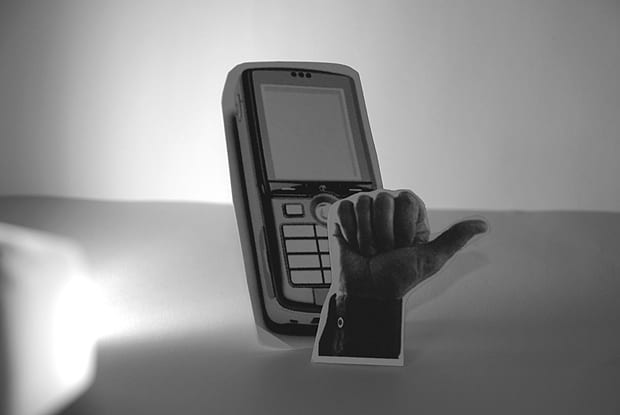
words Adam Fisher
Pull back and treat yourself to the longest possible view of design history. The highlight reel starts with the first man-ape who rises from all fours in order to wield a bone as a cudgel. Cut to the flint-knapper who discovers how to fashion an obsidian blade, then jump to a close-up of that blade being used to make marks on clay, the first written record. However one chooses to splice the film, it’s clear that human evolution is necessarily a collaboration between our minds and our hands. Some scholars, looking more closely, find more to the tool-making story than the upward march of progress. They say that though we may think we design our tools, it’s really our tools that design us. In The Alphabet vs the Goddess, physician and thinker Leonard Shlain argues that this is particularly true when it comes to the tools we use to communicate. The pen moves the mind, in other words.
If this idea is even a little bit true, where does it lead us? What’s the final clip on the three-million-year highlight reel of human achievement? Consider the following scene: the final round of the 2008 American National Texting Championship. You may have even seen it this summer on MTV. A dozen champions stand on the stage in a packed New York City nightclub. Three months of regional battles have led to this, the final phrase in a national text-typing contest. It flashes on a screen above them: “Does everybody here know the alphabet? Let’s text. Here it goes… AbcDeFghiJKlmNoPQrS
tuvWXy & Z! Now I know my A-B-C’s, next time won’t you text with me?”
Slowly track into a close-up of 20-year-old Nathan Schwartz: thumbs flying over the QWERTY keypad on his mobile phone, he pounds out his ABCs, sends them off to the judges, and then snaps his phone shut to wait for the results. When it rings back, he knows that his 60-second time has just won him the championship, and an oversize check for $50,000 that he lifts over his head like a prizefighter.
Schwartz thumbs out 5,000 SMS messages a month. He and the 15,000 others that he beat can text faster than most can type. The mobile phone generation has pushed the thumb to new heights. Whether this fact is simply grist for MTV or worthy of inclusion in the grand sweep of the history of man rests on the answer to a single question: has the thumb pushed back?
It was Sadie Plant, the founder of the Cybernetic Culture Research Unit at the University of Warwick, who first noticed the physical evidence of a change. In 2001 Plant circled the world on an ethnographic mission looking at the integration of mobile phones and human cultures. She travelled to eight cities – London, Birmingham, Dubai, Peshawar, Chicago, Beijing, Hong Kong and Bangkok – taking notes and interviewing people about their mobiles. Everywhere she went documented instances of the new mobile technoculture chafing against traditional mores. But it was in Tokyo where she encountered the oya yubi sedai, the “thumb tribe”.
For kids in urban Japan the mobile is not just a phone. It’s a fashion statement, it’s a credit card, and most important of all, it’s the internet. Their whole world is in their hands, and it’s the thumb that navigates through it. So much so that their digitus primus leads the way in the real world as well as the virtual. The oya yubi sedai use their thumbs to point, even to ring doorbells.
In his most recent book, Our Own Devices, historian of technology Edward Tenner puts the rise of the thumb tribe in the context of 300 years of history. The piano elevated the thumb. The typewriter relegated it to a mere spacebar-pusher. Now, with the diminutive keys of the mobile, the thumb is back. “A proletarian digit resurgent in a digital age,” Tenner concludes, approvingly.
Shlain argues that the tools we choose to write with can change who we are. Plant discovered that we are indeed changing. Tenner tells us not to worry, that it has all happened before. In all this scholarship, however, one thing gets lost: a thumb-typing reality check.
Schwartz’s record clocks in at the equivalent of 30 words per minute. Compare that to the world touch-typing record: 212 words per minute. Clearly that’s not evolution, but its opposite, devolution. So if the mobile phones we use are using us, then d1d w3 g3t 0wn’d?
Adam Fisher is a technology writer based in San Francisco















